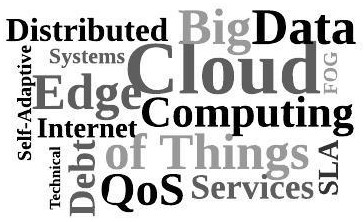Research
My research has been on Internet-Based Distributed Computing Systems but not limited to, Cloud Computing, Service Computing and Self-Adaptive Systems. I am particularly interested in engineering Software-Intensive (Autonomous ) Distributed Systems, understanding, improving and assessing their run-time behaviour from performance (QoS) and economic-driven perspectives, and applying them in Cloud-Based IoT Systems, Cyber-Physical Systems and Service-Oriented Systems. Most of my work leverages Computational Intelligence, Machine Learning and Economic Theory to tackle these problems..Apart from that my PhD research work has been published in the top conferences such as IEEE ICWS, IEEE/ACM SEAMS and IEEE ICPADS etc.
Service Composition in SaaS Cloud using Technical Debt Analysis
Service composition is a technique for building
software application by
composing web services in SaaS Cloud. However, a software
application
running in SaaS cloud
would inevitably operate under dynamic changes on the workload from
the
tenants, and thus
it is not uncommon for the composition to encounter
under-utilisation
and over-utilisation
on the component services. The former reduces the service revenue
and
the latter, in
contrast to the over-utilisation that leads to QoS constraints
violation. In fact,
both cases are undesirable, and bring a challenging task: when to
(re)compose the component
services such that the utility over time is maximised ?.
In this project, we take advantage of "Technical Debt" metaphor for
making economic-driven
decisions on the selection and composition of component services in
the
composite service
execution. In particular, the ultimate goal of this research work is
to
create economic-driven
approaches for understanding, improving and assessing the run-time
behaviour of composed
software application and maximise the service revenue and
satisfaction
of tenants in
SaaS cloud. For more information, please read C2-IEEE ICWS-2019 and
C3-IEEE/ACM SEAMS-2020
research papers.






